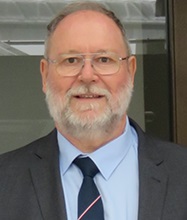Dennis Frost
Dennis was diagnosed with frontal temporal dementia at the age of 59. Since that time he has been a strong advocate for dementia friendly communities, most notably the Australian Dementia Kiama pilot project.

This was a collaborative project between Dementia Australia, University of Wollongong, Kiama Municipal Council and the Kiama community. Internationally this project has been centre stage in the “dementia friendly communities” movement, and is the only dementia friendly project to be recognised by the WHO.
One of the main outcomes is that the community became an enabler for people with dementia to continue to be part of that community.
Dennis will be sharing his experiences on the Dementia Kiama journey and will convince us of the benefits of having more dementia friendly communities in NZ.
Dennis is one of the keynote speakers at our upcoming Conference, Living with dementia: Taking action for a better future, Te noho rangatira me te mate wareware: Te kōkiri kaupapa mō ngā rā e tū mai nei.
We caught up with Dennis to find out more.
Can you give us a sneak preview of what you will be discussing at the Conference?
What I will be presenting on begins with a view of the stigma and discrimination we experience, then leads to what we can do to overcome these problems, which is a lead into dementia friendly communities. One theme that underlies it all is that by understanding the past and looking at other people’s perspectives, we can be inspired build a better future.
What motivated you want to create a dementia friendly community?
I was originally motivated to become involved in dementia friendly communities purely out of the need to be involved in a constructive outside activity. I quickly encountered many diverse people that had similar views and were all acting to create a more positive environment.
What would you like the future of dementia support to look like?
The future I hope for is one where all individuals are respected and supported in their own choices irrespective of their ‘disability’. Support is individual and from the community, not a “one size fits all” profit motivated model.

